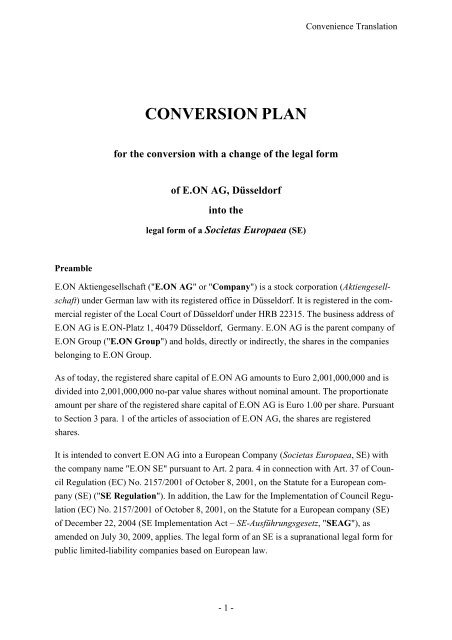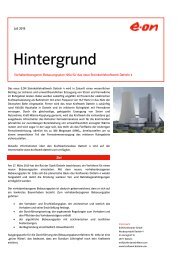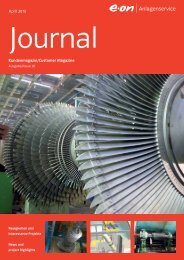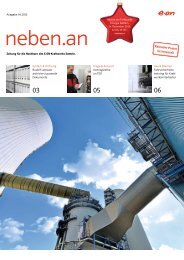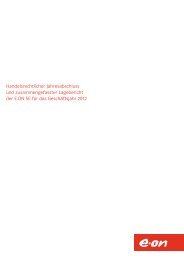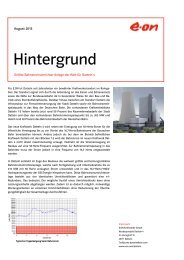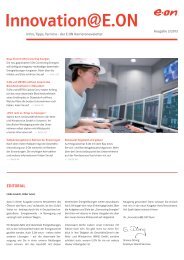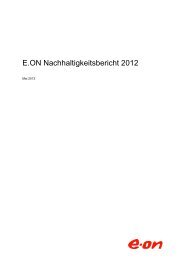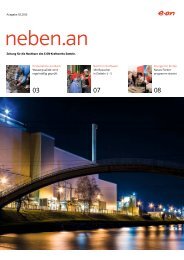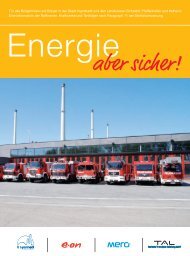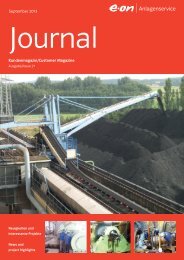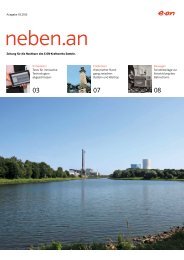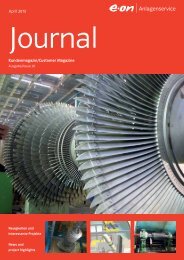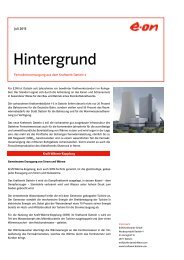CONVERSION PLAN - E.ON AG
CONVERSION PLAN - E.ON AG
CONVERSION PLAN - E.ON AG
Create successful ePaper yourself
Turn your PDF publications into a flip-book with our unique Google optimized e-Paper software.
Convenience Translation<br />
<strong>C<strong>ON</strong>VERSI<strong>ON</strong></strong> <strong>PLAN</strong><br />
for the conversion with a change of the legal form<br />
of E.<strong>ON</strong> <strong>AG</strong>, Düsseldorf<br />
into the<br />
legal form of a Societas Europaea (SE)<br />
Preamble<br />
E.<strong>ON</strong> Aktiengesellschaft ("E.<strong>ON</strong> <strong>AG</strong>" or "Company") is a stock corporation (Aktiengesellschaft)<br />
under German law with its registered office in Düsseldorf. It is registered in the commercial<br />
register of the Local Court of Düsseldorf under HRB 22315. The business address of<br />
E.<strong>ON</strong> <strong>AG</strong> is E.<strong>ON</strong>-Platz 1, 40479 Düsseldorf, Germany. E.<strong>ON</strong> <strong>AG</strong> is the parent company of<br />
E.<strong>ON</strong> Group ("E.<strong>ON</strong> Group") and holds, directly or indirectly, the shares in the companies<br />
belonging to E.<strong>ON</strong> Group.<br />
As of today, the registered share capital of E.<strong>ON</strong> <strong>AG</strong> amounts to Euro 2,001,000,000 and is<br />
divided into 2,001,000,000 no-par value shares without nominal amount. The proportionate<br />
amount per share of the registered share capital of E.<strong>ON</strong> <strong>AG</strong> is Euro 1.00 per share. Pursuant<br />
to Section 3 para. 1 of the articles of association of E.<strong>ON</strong> <strong>AG</strong>, the shares are registered<br />
shares.<br />
It is intended to convert E.<strong>ON</strong> <strong>AG</strong> into a European Company (Societas Europaea, SE) with<br />
the company name "E.<strong>ON</strong> SE" pursuant to Art. 2 para. 4 in connection with Art. 37 of Council<br />
Regulation (EC) No. 2157/2001 of October 8, 2001, on the Statute for a European company<br />
(SE) ("SE Regulation"). In addition, the Law for the Implementation of Council Regulation<br />
(EC) No. 2157/2001 of October 8, 2001, on the Statute for a European company (SE)<br />
of December 22, 2004 (SE Implementation Act – SE-Ausführungsgesetz, "SE<strong>AG</strong>"), as<br />
amended on July 30, 2009, applies. The legal form of an SE is a supranational legal form for<br />
public limited-liability companies based on European law.<br />
- 1 -
Convenience Translation<br />
E.<strong>ON</strong> Group is an international group with a clear European focus. The conversion of E.<strong>ON</strong><br />
<strong>AG</strong> into the legal form of a European company (Societas Europaea, SE) which is proposed to<br />
the general meeting of shareholders reflects the increasing internationality of E.<strong>ON</strong> Group.<br />
In addition, the proposed conversion into an SE will strengthen the Company's Corporate<br />
Governance and, by virtue of the intended restriction of the number of members of the Supervisory<br />
Board to twelve – while maintaining its composition of shareholder representatives<br />
and employee representatives on a parity basis –, will result in an improved performance and<br />
effectiveness of the work of the Supervisory Board. However, subject to an agreement to this<br />
effect in the course of the involvement of employees, the employee representatives will not<br />
be exclusively appointed by the employee representatives of E.<strong>ON</strong> Group in Germany and<br />
the German labour unions, but with the involvement of the employee representatives and labour<br />
unions from other member states of the European Union ("EU") or, respectively, a signatory<br />
state to the European Economic Area ("EEA"). In this respect, the internationalization<br />
of E.<strong>ON</strong> Group will be reflected in the Supervisory Board as a whole. The registered office<br />
and the head office of the company will continue to be situated in Germany.<br />
The Board of Management of E.<strong>ON</strong> <strong>AG</strong> therefore prepares the following conversion plan:<br />
Section 1<br />
Conversion of E.<strong>ON</strong> <strong>AG</strong> into E.<strong>ON</strong> SE<br />
E.<strong>ON</strong> <strong>AG</strong> is being converted into a European Company (Societas Europaea, SE) pursuant to<br />
Art. 2 para. 4 in connection with Art. 37 SE Regulation.<br />
E.<strong>ON</strong> <strong>AG</strong> has numerous subsidiaries which are subject to the laws of other member states,<br />
including, inter alia, E.<strong>ON</strong> International Finance B.V., with its registered office in Rotterdam<br />
and its head office in Venlo, the Netherlands, formed on November 14, 1983, registered in<br />
the commercial register of Rotterdam under the registration number 33174429. Thus, for<br />
more than two years, there has been one subsidiary of E.<strong>ON</strong> <strong>AG</strong> that is governed by the laws<br />
of another member state. The requirement for the conversion of E.<strong>ON</strong> <strong>AG</strong> into E.<strong>ON</strong> SE pursuant<br />
to Art. 2 para. 4 SE Regulation is thereby fulfilled.<br />
The conversion of E.<strong>ON</strong> <strong>AG</strong> into an SE with a change of the legal form does neither lead to a<br />
liquidation of E.<strong>ON</strong> <strong>AG</strong> nor to the formation of a new legal entity. There will be no transfer<br />
of assets because of the preservation of the identity of the legal entity. E.<strong>ON</strong> <strong>AG</strong> continues to<br />
exist in the legal form of an SE. The participations held in the company by the shareholders<br />
continue to exist unchanged.<br />
- 2 -
Convenience Translation<br />
Section 2<br />
Effectiveness of the conversion<br />
The conversion becomes effective upon its registration in the commercial register ("Effective<br />
Time of Conversion").<br />
Section 3<br />
Company name, registered office, registered share capital and articles of association of<br />
E.<strong>ON</strong> SE<br />
3.1 The company name of the SE is "E.<strong>ON</strong> SE".<br />
3.2 The registered office of E.<strong>ON</strong> SE is Düsseldorf, Germany. This is also the place of its<br />
head office.<br />
3.3 E.<strong>ON</strong> SE shall have the articles of association enclosed as an Annex. The articles of<br />
association of E.<strong>ON</strong> SE form part of this conversion plan.<br />
3.4 The entire registered share capital of E.<strong>ON</strong> <strong>AG</strong> in the amount existing at the Effective<br />
Time of Conversion (current amount: Euro 2,001,000,000) and as divided into no-par<br />
value registered shares without nominal amount (current number of shares:<br />
2,001,000,000) becomes the registered share capital of E.<strong>ON</strong> SE. The persons and<br />
companies who are shareholders of E.<strong>ON</strong> <strong>AG</strong> at the Effective Time of Conversion<br />
become shareholders of E.<strong>ON</strong> SE. They will hold an interest in the registered share<br />
capital of E.<strong>ON</strong> SE in the same extent and with the same number of no-par value<br />
shares as they did in respect of the registered share capital of E.<strong>ON</strong> <strong>AG</strong> immediately<br />
prior to the conversion becoming effective. The arithmetic portion of each no-par value<br />
share in the registered share capital (currently Euro 1.00) is maintained in the same<br />
way it exists immediately prior to the conversion becoming effective.<br />
3.5 At the Effective Time of Conversion,<br />
(i)<br />
(ii)<br />
the amount of the registered share capital with its division into no-par value<br />
shares pursuant to Section 3 para. 1 of the articles of association of E.<strong>ON</strong> SE<br />
corresponds to the amount of the registered share capital with its division into<br />
no-par value shares pursuant to Section 3 para. 1 of the articles of association<br />
of E.<strong>ON</strong> <strong>AG</strong>, and<br />
the conditional capital pursuant to Section 3 para. 4 of the articles of association<br />
of E.<strong>ON</strong> SE corresponds to the conditional capital pursuant to Section 3<br />
of the articles of association of E.<strong>ON</strong> <strong>AG</strong>.<br />
- 3 -
Convenience Translation<br />
(iii)<br />
the authorized capital pursuant to Section 3 para. 5 of the articles of association<br />
of E.<strong>ON</strong> SE corresponds to the authorized capital still available pursuant<br />
to Section 3 of the articles of association of E.<strong>ON</strong> <strong>AG</strong>. The authorized capital<br />
provided for in Section 3 para. 2 of the articles of association of E.<strong>ON</strong> <strong>AG</strong> in<br />
the version prior to the possible adoption of resolutions in the course of the<br />
general meeting of shareholders on May 3, 2012, has become obsolete due to<br />
the expiry of the authorization. Therefore, it is not included in the articles of<br />
association of E.<strong>ON</strong> SE.<br />
The Supervisory Board of E.<strong>ON</strong> SE is authorized and at the same time instructed to<br />
make any amendments to the enclosed articles of association of E.<strong>ON</strong> SE which result<br />
from the foregoing before the registration of the conversion in the commercial register<br />
of E.<strong>ON</strong> <strong>AG</strong>.<br />
3.6 Shareholders who object to the conversion are not being offered a cash compensation,<br />
since this is not provided for by statutory law.<br />
Section 4<br />
Board of Management<br />
Notwithstanding the statutory competences of the Supervisory Board of E.<strong>ON</strong> SE, it is to be<br />
assumed that the current acting members of the Board of Management of E.<strong>ON</strong> <strong>AG</strong> will be<br />
appointed as members of the Board of Management of E.<strong>ON</strong> SE. The acting members of the<br />
Board of Management of E.<strong>ON</strong> <strong>AG</strong> are Dr. Johannes Teyssen (Chairman), Jørgen Kildahl,<br />
Prof. Dr. Klaus-Dieter Maubach, Dr. Bernhard Reutersberg, Dr. Marcus Schenck and Regine<br />
Stachelhaus.<br />
Section 5<br />
Supervisory Board<br />
5.1 Pursuant to Section 8 para. 1 of the articles of association of E.<strong>ON</strong> SE, E.<strong>ON</strong> SE is to<br />
have a Supervisory Board which, in deviation from the current situation at E.<strong>ON</strong> <strong>AG</strong>,<br />
comprises twelve instead of twenty members. Of the twelve members, six members<br />
are to be elected upon proposals of the employees. The proposals of the employees<br />
are binding for the general meeting of shareholders. If an agreement regarding the<br />
participation of the employees concluded in accordance with the German Act on the<br />
Participation of Employees in a European company (SE Employee Participation Act –<br />
"SEBG") stipulates a different appointment procedure for the employee representatives<br />
on the Supervisory Board, the latter are not appointed by the general meeting,<br />
but in accordance with the agreed appointment procedure.<br />
- 4 -
Convenience Translation<br />
5.2 The terms of office of the members of the Supervisory Board of E.<strong>ON</strong> <strong>AG</strong> terminate<br />
upon the effectiveness of the conversion by virtue of the registration of E.<strong>ON</strong> SE in<br />
the commercial register.<br />
Of the shareholder representatives on the Supervisory Board of E.<strong>ON</strong> <strong>AG</strong>, the following<br />
members are to be appointed as members of the Supervisory Board of E.<strong>ON</strong> SE<br />
pursuant to Section 8 para. 6 of the articles of association of E.<strong>ON</strong> SE:<br />
• Baroness Denise Kingsmill CBE<br />
Lawyer, Member of House of Lords<br />
London, Great Britain<br />
• Prof. Dr. Ulrich Lehner<br />
Member of Partner Committee of Henkel <strong>AG</strong> & Co. KGaA<br />
Düsseldorf<br />
• René Obermann<br />
Chairman of the Board of Management of Deutsche Telekom <strong>AG</strong><br />
Bonn<br />
• Dr. Karen de Segundo<br />
Attorney<br />
Surrey, Great Britain<br />
• Dr. Theo Siegert<br />
Managing Partner of de Haen-Carstanjen & Söhne<br />
Düsseldorf<br />
• Werner Wenning<br />
Chairman of the Supervisory Board of E.<strong>ON</strong> <strong>AG</strong><br />
Leverkusen<br />
As substitute members of the shareholder representatives are appointed:<br />
• Bård Mikkelsen<br />
Businessman, former President and Chairman of the Board of Management of<br />
Statkraft AS<br />
Hosle, Norwegen<br />
- 5 -
Convenience Translation<br />
• Dr. Georg Freiherr von Waldenfels<br />
Lawyer<br />
München<br />
They are to become members of the Supervisory Board in the order stated above in<br />
the event that a shareholder representative on the first Supervisory Board ceases to be<br />
a Supervisory Board member prior to the expiry of his/her tenure of office and the<br />
General Meeting of hareholders does not appoint a successor prior to such cessation<br />
of membership.<br />
The employee representatives on the Supervisory Board of E.<strong>ON</strong> SE are to be appointed<br />
taking into account the results of the employee involvement procedure (see<br />
Section 6 below).<br />
Section 6<br />
Information on the procedure for arrangements for employee involvement<br />
6.1 In order to safeguard the rights to participate in entrepreneurial decisions acquired by<br />
the employees of E.<strong>ON</strong> <strong>AG</strong>, in the course of the conversion into an SE, a procedure<br />
for the involvement of the employees at E.<strong>ON</strong> SE is to be conducted. The objective is<br />
the conclusion of an agreement regarding the involvement of employees in the SE,<br />
i.e., in particular, regarding the participation of the employees in the Supervisory<br />
Board of E.<strong>ON</strong> SE and the procedure for the information and consultation of employees<br />
either by establishment of an SE Works Council or in another way to be agreed<br />
upon with the Board of Management of E.<strong>ON</strong> <strong>AG</strong>.<br />
The procedure for the involvement of employees is characterized by the principle of<br />
protecting the acquired rights of the employees of E.<strong>ON</strong> <strong>AG</strong>. The extent of the involvement<br />
of the employees in the SE is determined by Section 2 para. 8 of the SEBG<br />
which, essentially, follows Art. 2 lit. h) of Council Directive 2001/86/EC of October<br />
8, 2001, supplementing the Statute for a European company with regard to the involvement<br />
of employees. Involvement of employees is the collective term for any<br />
mechanism – including, in particular, information, consultation and participation –<br />
through which employees' representatives may exercise an influence on decisions to<br />
be taken within the company.<br />
6.2 As parent company of E.<strong>ON</strong> Group, E.<strong>ON</strong> <strong>AG</strong> has a Supervisory Board with twenty<br />
members which is composed on a parity basis in accordance with the German Codetermination<br />
Act 1976 (Mitbestimmungsgesetz – "MitbestG 1976"). With regard to<br />
- 6 -
Convenience Translation<br />
the ten employee representatives on the Supervisory Board of E.<strong>ON</strong> <strong>AG</strong>, presently<br />
only the employees of the group companies employed in Germany have the active and<br />
passive voting right in accordance with the MitbestG 1976. The provisions of the<br />
MitbestG 1976 regarding the representation of employees on the Supervisory Board<br />
of E.<strong>ON</strong> <strong>AG</strong> are being replaced, upon conversion into an SE, by the provisions of the<br />
SEBG (with regard to the other consequences of the change of the legal form for the<br />
employees and their representative bodies, see below Section 7). Upon the effectiveness<br />
of the conversion of E.<strong>ON</strong> <strong>AG</strong> into an SE, the terms of office of the employee<br />
representatives as well as the terms of office of the shareholder representatives on the<br />
Supervisory Board of E.<strong>ON</strong> <strong>AG</strong> terminate (see above § 5). The shareholder representatives<br />
on the first Supervisory Board of E.<strong>ON</strong> SE are already appointed in the articles<br />
of association of E.<strong>ON</strong> SE. The employee representatives on the first Supervisory<br />
Board of E.<strong>ON</strong> SE will be appointed after the completion of the procedure for the involvement<br />
of employees.<br />
In addition to the Supervisory Board of E.<strong>ON</strong> <strong>AG</strong>, there are additional bodies at the<br />
level of its group companies in which the employees have participation rights.<br />
In the companies of E.<strong>ON</strong> Group in the EU and the EEA, there are bodies representing<br />
employees in accordance with legal requirements under applicable national laws.<br />
At E.<strong>ON</strong> <strong>AG</strong>, a works council has been established. For E.<strong>ON</strong> Group, a Group Works<br />
Council has been established at E.<strong>ON</strong> <strong>AG</strong>. Currently, the Group Works Council comprises<br />
31 representatives of the German companies within E.<strong>ON</strong> Group.<br />
At the European level, the E.<strong>ON</strong> European Works Council has been established on the<br />
basis of a group works agreement as an information and consultation body of employees<br />
of E.<strong>ON</strong> employed in Europe.<br />
6.3 The initiation of the procedure for the involvement of the employees is conducted in<br />
accordance with the provisions of the SEBG. The latter requires that the management<br />
body of the participating company, i.e. the Board of Management of E.<strong>ON</strong> <strong>AG</strong>, notifies<br />
the employees or their representative bodies involved about the conversion project<br />
and requests them to establish a Special Negotiating Body. The procedure is to be<br />
initiated unrequested and without undue delay after the Board of Management of<br />
E.<strong>ON</strong> <strong>AG</strong> has published the conversion plan prepared by it. The publication is made<br />
by virtue of the filing of the conversion plan attested by a notary public with the competent<br />
commercial register in Düsseldorf. The notification of the employees or their<br />
representative bodies, respectively, includes, in particular, (i) the names and structure<br />
- 7 -
Convenience Translation<br />
of E.<strong>ON</strong> <strong>AG</strong>, the concerned subsidiaries and concerned establishments, and their distribution<br />
among the member states; (ii) the bodies representing employees existing<br />
within these companies and establishments; (iii) the number of persons employed in<br />
these companies and establishments, and the total number of persons employed in a<br />
given member state determined on the basis thereof, and (iv) the number of employees<br />
enjoying participation rights in the corporate bodies of these companies.<br />
6.4 It is provided by statutory law that within a period of ten weeks after the notification<br />
of the employees or, respectively, their representative bodies described in Section 6.3<br />
the employees or their representative bodies, respectively, elect or appoint the members<br />
of the Special Negotiating Body, which is composed of employee representatives<br />
from all member states of the EU and from all signatory states of the EEA involved.<br />
It is the task of this Special Negotiating Body to negotiate with the management of the<br />
company the procedural details of the involvement procedure and the determination<br />
of the participation right of the employees within the SE.<br />
The establishment and composition of the Special Negotiating Body are, in principle,<br />
subject to German law (Sections 4 to 7 SEBG). The allocation of the seats in the Special<br />
Negotiating Body to the individual member states of the EU and the signatory<br />
states to the EEA in which E.<strong>ON</strong> Group has employees is governed, in respect of the<br />
formation of an SE with its registered office in Germany, by Section 5 para. 1 SEBG.<br />
The allocation of the seats follows the following basic principles:<br />
Each member state of the EU and signatory state to the EEA in which E.<strong>ON</strong> Group<br />
has employees is allocated at least one seat. The number of seats allocated to a member<br />
state of the EU or a signatory state to the EEA is increased by 1 in each case<br />
where the number of employees employed in this member state of the EU or signatory<br />
state to the EEA exceeds the thresholds of 10%, 20%, 30% etc. of all employees of<br />
E.<strong>ON</strong> Group within the EU or of the EEA, respectively. The relevant point in time for<br />
the determination of the allocation of seats is, in principle, the time of the notification<br />
of the employees or their respective representative bodies (cf. Section 4 para. 4<br />
SEBG).<br />
On the basis of the employee figures of E.<strong>ON</strong> Group in the individual member states<br />
of the EU and the signatory states to the EEA as of December 31, 2011, the following<br />
allocation of seats applies:<br />
- 8 -
Convenience Translation<br />
Country Number of employees % (rounded) Representatives in the SNB<br />
Belgium 191 0.24 1<br />
Bulgaria 2,039 2.52 1<br />
Denmark 78 0.10 1<br />
Germany 41,898 51.79 6<br />
Finland 84 0.10 1<br />
France 1009 1.26 1<br />
Great Britain 12,216 15.10 2<br />
Italy 1,200 1.48 1<br />
Luxembourg 54 0.07 1<br />
Netherlands 916 1.13 1<br />
Norway 50 0.06 1<br />
Austria 11 0.01 1<br />
Poland 868 1.07 1<br />
Portugal 13 0.02 1<br />
Romania 6,613 8.17 1<br />
Sweden 3,560 4.40 1<br />
Slovakia 115 0.14 1<br />
Spain 1,271 1.57 1<br />
Czech Republic 3,187 3.94 1<br />
Hungary 5,534 6.84 1<br />
Total (20 countries) 80,907 100.00 26<br />
With regard to the election or appointment, respectively, of the members of the Special<br />
Negotiating Body from the individual EU member states and EEA signatory<br />
states the relevant national provisions of law apply. Thus, a variety of procedures are<br />
being applied, such as the election by direct vote, appointment by labour unions or, as<br />
is the case under German law, the election by an election body (cf. Section 8 SEBG);<br />
in the case of the employees in Germany, the election body is composed of all members<br />
of the Group Works Council. The election or, respectively, appointment of the<br />
- 9 -
Convenience Translation<br />
members as well as the establishment of the Special Negotiating Body is, in principle,<br />
the responsibility of the employees and their representative bodies involved and of the<br />
relevant unions, respectively.<br />
6.5 At the earliest after the determination of all members of the Special Negotiating<br />
Body, but no later than 10 weeks after the notification pursuant to Section 4 para. 2<br />
and para. 3 SEBG (cf. Sections 12 para. 1, 11 para. 1 SEBG), the Board of Management<br />
of E.<strong>ON</strong> <strong>AG</strong> has to issue, without undue delay, the invitations for the constituent<br />
meeting of the Special Negotiating Body. On the day of the constituent meeting, the<br />
procedure for the establishing of the Special Negotiating Body ends and the negotiations<br />
begin for which a duration of up to six months is provided for under statutory<br />
law. This period may be extended to a period of up to one year by mutual consent of<br />
the parties to the negotiation.<br />
The negotiation procedure takes place also if the period for the election or appointment<br />
of individual or all members of the Special Negotiating Body is exceeded for<br />
reasons within the responsibility of the employees (Section 11 para. 2 sentence 1<br />
SEBG).<br />
Members who are being elected or appointed during the course of the negotiations<br />
may, at any time, participate in the negotiation procedure (Section 11 para. 2 sentence<br />
2 SEBG). However, a member joining the ongoing negotiations has to accept<br />
the current status of the negotiations at that time. There is no claim for an extension of<br />
the six-months negotiation period (Section 20 SEBG).<br />
The objective of the negotiations is the conclusion of an agreement regarding the involvement<br />
of employees in E.<strong>ON</strong> SE. The subject matter of the negotiations is the<br />
participation of the employees in the Supervisory Board of E.<strong>ON</strong> SE and the determination<br />
of the procedure for the information and consultation of employees either by<br />
establishment of an SE Works Council or in another way.<br />
6.6 As required by Art. 40 para. 3 SE Regulation, Section 17 para. 1 SE<strong>AG</strong>, the articles of<br />
association have to stipulate the number of members of the Supervisory Board or the<br />
rules for the determination of such number. Section 8 para. 1 of the articles of association<br />
of E.<strong>ON</strong> SE stipulates that the future Supervisory Board shall comprise twelve<br />
members. In this regard, it is mandatory that the principle of composition on a parity<br />
basis be maintained (cf. Sections 15 para. 5, 16 para. 3 SEBG). Accordingly, the arti-<br />
- 10 -
Convenience Translation<br />
cles of association of E.<strong>ON</strong> SE provide that six of the members of the Supervisory<br />
Board are to be appointed upon the proposal of the employees.<br />
No resolution may be adopted which results in a reduction of employee participation<br />
rights (cf. Section 15 para. 5 SEBG). Equally, no resolution may be adopted to the effect<br />
that no negotiations should be entered into or that negotiations already entered into<br />
should be broken off (cf. Section 16 para. 3 SEBG). In the event that such agreement<br />
regarding employee involvement is not concluded, employee participation is<br />
governed by the subsidiary regulation by operation of law which is explained in Section<br />
6.9 below.<br />
6.7 Furthermore, in the agreement between the Board of Management and the Special<br />
Negotiating Body a procedure is to be stipulated for the purpose of the information<br />
and consultation of the employees in the SE. This may be achieved by establishing an<br />
SE Works Council or by another procedure stipulated by the parties to the negotiations<br />
which facilitates the information and consultation of the employees of E.<strong>ON</strong> SE.<br />
In the case of the establishment of an SE Works Council, the following has to be<br />
stipulated: the scope of application, the number of its members and the allocation of<br />
seats, the functions and the procedure for its information and consultation, the frequency<br />
of meetings, the financial and material resources to be made available, the<br />
date of entry into force and the duration of the agreement as well as the circumstances<br />
in which the agreement is to be renegotiated and the procedure to be used in this regard.<br />
Instead of establishing an SE Works Council, another procedure may also be<br />
stipulated which facilitates the information and consultation of the employees.<br />
Further, it is to be stipulated in the agreement that negotiations concerning the involvement<br />
of employees in the SE shall also be opened prior to structural changes to<br />
the SE.<br />
6.8 The conclusion of an agreement between the management of the company and the<br />
Special Negotiating Body regarding the involvement of employees requires a resolution<br />
adopted by the Special Negotiating Body. The resolution is to be adopted by a<br />
majority of the appointed members, provided that this majority also represents a majority<br />
of the represented employees. No resolution may be adopted which results in a<br />
reduction of employee participation rights (cf. Section 15 para. 5 SEBG). It is also not<br />
permissible to refrain from entering into or to abandon negotiations (cf. Section 16<br />
para. 3 SEBG).<br />
- 11 -
Convenience Translation<br />
Art. 12 para. 4 SE Regulation stipulates that the articles of association of the SE may<br />
not, at any time, contradict a negotiated agreement. Therefore, if necessary, the articles<br />
of association have to be amended by resolution of the general meeting of<br />
E.<strong>ON</strong> <strong>AG</strong> in case that a deviating stipulation regarding the participation of the employees<br />
is laid down in an agreement on the involvement of employees in future<br />
E.<strong>ON</strong> SE. The conversion of E.<strong>ON</strong> <strong>AG</strong> into an SE would only become effective after<br />
the registration of the alteration of the articles of association in the commercial register<br />
of the company.<br />
6.9 If no agreement regarding the involvement of employees is being reached within the<br />
negotiation period, a subsidiary regulation by operation of law applies; the latter may<br />
also be agreed upon from the outset as the content of the agreement.<br />
In the event that the subsidiary regulation by operation of law applies, it is mandatory<br />
that with regard to employee participation the principle of participation on a parity basis,<br />
which is already applied at E.<strong>ON</strong> <strong>AG</strong>, is continued also in respect of the Supervisory<br />
Board of E.<strong>ON</strong> SE, with the consequence that half of the members of the Supervisory<br />
Board of E.<strong>ON</strong> SE would be employee representatives. However, in contrast to<br />
the current situation regarding the employee representatives on the Supervisory Board<br />
of E.<strong>ON</strong> <strong>AG</strong>, these representatives would no longer be exclusively appointed by the<br />
employees in Germany, but by all employees in the member states of the EU and the<br />
signatory states to the EEA to which seats on the Supervisory Board have been allocated<br />
pursuant to Section 36 para. 1 SEBG. The employees would have to appoint, in<br />
accordance with the respective provisions applicable in these countries, their employee<br />
representatives who are to be elected by the general meeting of E.<strong>ON</strong> SE. If no<br />
appointment were made, the SE Works Council would have to make it.<br />
On the basis of the current number of employees and their distribution by countries, in<br />
accordance with Section 36 para. 1 SEBG on the Supervisory Board composed of<br />
twelve members on a parity basis there would be four seats for the employees from<br />
Germany, one seat for employees from the United Kingdom and one seat – subject to<br />
the adoption of a resolution by the SE Works Council – for the employees of E.<strong>ON</strong><br />
Group working in Romania. The necessity for the adoption of a resolution by the SE<br />
Works Council concerning the allocation of a seat to Romania follows from Section<br />
36 para. 1 sentence 3 SEBG, according to which in the event that in the course of<br />
the proportionate allocation the employees of one or more member states are not allocated<br />
a seat the last seat to be allocated is to be allocated to one of the so far nonrepresented<br />
member states. It follows from the rationale of Section 5 para. 3 SEBG<br />
- 12 -
Convenience Translation<br />
that the seat to be allocated is to be allocated to that member state which has the largest<br />
number of employees among the non-represented member states.<br />
With regard to the protection of the right to information and consultation of the employees<br />
of E.<strong>ON</strong> SE, the subsidiary regulation by operation of law would have the<br />
consequence that an SE Works Council would have to be established, the function of<br />
which would be to safeguard the right to information and consultation of the employees<br />
in the SE. The council would be responsible for matters which affect the SE itself,<br />
one of its subsidiaries or one of its establishments in another member state or which<br />
go beyond the powers of the competent bodies at the level of the individual member<br />
states. The SE Works Council would have to be notified and consulted annually with<br />
regard to the development of the business situation and the future prospects of the SE.<br />
It would have to be notified and consulted with regard to extraordinary circumstances.<br />
The composition of the SE Works Council as well as the election of its members<br />
would be determined, in principle, in accordance with the provisions applicable to the<br />
composition and appointment of the members of the Special Negotiating Body.<br />
6.10 In case the subsidiary regulation by operation of law applies, it is to be reviewed every<br />
two years during the existence of the SE by the management of the SE whether<br />
changes within the SE, its subsidiaries or its establishments require an alteration of<br />
the composition of the SE Works Council. Besides, in case the subsidiary regulation<br />
by operation of law applies, four years after its establishment the SE Works Council<br />
has to resolve with the majority of its members whether negotiations shall be reopened<br />
with regard to an agreement for the involvement of employees within the SE<br />
or whether the existing regulations are to remain in place. If a resolution is adopted to<br />
enter into negotiations for an agreement regarding the involvement of employees, for<br />
the purpose of these negotiations the SE Works Council replaces the Special Negotiating<br />
Body.<br />
6.11 The necessary costs arising from the establishment and operation of the Special Negotiating<br />
Body will be borne by E.<strong>ON</strong> <strong>AG</strong> and, after the conversion, by E.<strong>ON</strong> SE. The<br />
obligation to bear the costs includes the material and personal expenses incurred in<br />
connection with the activities of the Special Negotiating Body, including the negotiations.<br />
In particular, premises, material resources (e.g. telephone, telefax, required literature),<br />
interpreters and clerical staff required for meetings are to be provided and the<br />
travel and subsistence expenses of the members of the Special Negotiating Body are<br />
to be met.<br />
- 13 -
Convenience Translation<br />
Section 7<br />
Other consequences of the conversion for the employees and their representative bodies<br />
7.1 The employment contracts of the employees of E.<strong>ON</strong> <strong>AG</strong> as well as the employment<br />
contracts of the employees of E.<strong>ON</strong> Group with the respective group companies are<br />
not affected by the conversion. Equally, with the exception of the procedure for the<br />
involvement of employees described in Section 6, the conversion of E.<strong>ON</strong> <strong>AG</strong> into an<br />
SE does not have any consequences for the employees of E.<strong>ON</strong> Group with regard to<br />
the participation rights of the employees of E.<strong>ON</strong> <strong>AG</strong> and of the companies of<br />
E.<strong>ON</strong> Group. Upon the effectiveness of the conversion of E.<strong>ON</strong> <strong>AG</strong> into an SE, the<br />
E.<strong>ON</strong> European Works Council will become obsolete and will be replaced by the SE<br />
Works Council or, respectively, any stipulations made in the Employee Involvement<br />
Agreement with regard to the details of the conduction of the procedure or the procedures<br />
for the information and consultation.<br />
7.2 Further, there are no other measures intended or planned as a consequence of the conversion<br />
which would affect the situation of the employees.<br />
Section 8<br />
Auditor<br />
PricewaterhouseCoopers Aktiengesellschaft Wirtschaftsprüfungsgesellschaft, Düsseldorf, is<br />
appointed as auditor for the first financial year of E.<strong>ON</strong> SE.<br />
Section 9<br />
No Additional Rights or Special Right<br />
9.1 Persons within the meaning of Section 194 para. 1 no. 5 of the German Transformation<br />
Act (UmwG) and/or Art. 20 para. 1 sentence 2 lit. f) SE Regulation are not<br />
granted any rights in addition to the shares described in Section 3.4 and no special<br />
measures are provided for for these persons.<br />
9.2 Persons within the meaning of Art. 20 para. 1 sentence 2 lit. g) SE Regulation will not<br />
be granted any special benefits in the course of the conversion.<br />
Düsseldorf, this March 6, 2012<br />
E.<strong>ON</strong> <strong>AG</strong><br />
The Board of Management<br />
Annex:<br />
Articles of association of E.<strong>ON</strong> SE<br />
- 14 -


